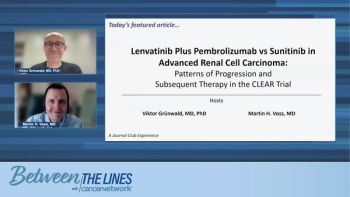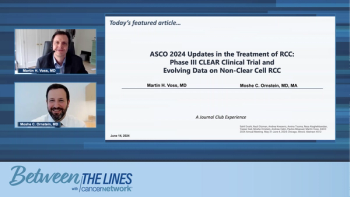Articles by Martin H. Voss, MD

Panelists discuss the rapidly evolving landscape of non–clear cell renal cell carcinoma, emphasizing the shift toward subtype-specific clinical trials, the critical role of next-generation sequencing and germline testing in guiding personalized treatment, and the importance of ongoing research collaborations to advance precision medicine and improve patient outcomes.

Panelists discuss the complexities of managing metastatic chromophobe renal cell carcinoma in a high-risk patient, emphasizing the role of molecular testing, limited but evolving therapeutic options including VEGF and mTOR inhibitors and immunotherapy, and the urgent need for subtype-specific clinical trials to guide personalized care.

Panelists discuss the case of a metastatic papillary kidney cancer patient, emphasizing the importance of balancing efficacy and tolerability in frontline therapy selection, incorporating molecular profiling, and considering immune-based combinations alongside targeted agents within a personalized, multidisciplinary care framework.

Panelists discuss the evolving clinical trial landscape in non–clear cell renal cell carcinoma, highlighting ongoing studies of combination therapies integrating TKIs and immuno-oncology agents, the challenges of rare subtypes, and the critical role of trials and support networks in advancing personalized treatment options.

Panelists discuss the KEYNOTE-B61 phase 2 trial of lenvatinib and pembrolizumab in non–clear cell renal cell carcinoma, highlighting its promising response rates, durable remissions, and subtype-specific outcomes, while emphasizing the need for further research to refine treatment approaches across diverse histologies.

Panelists discuss results from a phase 2 study of nivolumab plus cabozantinib in non–clear cell renal cell carcinoma, highlighting promising efficacy but notable treatment discontinuation rates likely linked to patient complexity, underscoring the need for further research on TKI-IO combinations in this diverse population.

Panelists discuss findings from a landmark European phase 3 trial showing improved overall survival with ipilimumab and nivolumab versus standard therapies in non–clear cell renal cell carcinoma, supporting the role of immune-based combinations across histologic subtypes and reinforcing the need for subtype-specific treatment strategies.

Panelists discuss first-line treatment strategies for metastatic non–clear cell renal cell carcinoma, highlighting the shift from broad, subtype-agnostic approaches to histology-specific and biomarker-driven therapies, including evolving combinations of TKIs and immunotherapy tailored to tumor biology.

Panelists discuss first-line therapy for non–clear cell renal cell carcinoma, emphasizing its diverse histologies, the challenges posed by limited clinical trial data, and the importance of molecular diagnostics and multidisciplinary strategies to guide personalized treatment.

Panelists discuss future directions in the treatment of advanced renal cell carcinoma (RCC), focusing on emerging therapies, clinical trials, and potential advancements in patient disease management.

Panelists discuss the follow-up analysis of the CLEAR trial, examining its implications for clinical decision-making in the treatment of advanced renal cell carcinomaRCC.

Panelists discuss time to progression by organ with lenvatinib plus + pembrolizumab in advanced renal cell carcinoma (RCC), highlighting key data and its the implications for treatment decisions.

Panelists discuss how the Phase phase 3 CLEAR trial evaluates organ-specific progression patterns in advanced renal cell carcinoma to better understand the efficacy of lenvatinib plus pembrolizumab compared to with sunitinib and guide subsequent treatment strategies.

Panelists discuss how clinical decision-making with TKI-IO combinations for advanced renal cell carcinoma involves evaluating factors such as efficacy, safety, patient characteristics, and the management of treatment-related toxicities to optimize patient outcomes.

Panelists discuss how metastatic site–specific outcomes with first-line therapies for clear cell renal cell carcinoma (ccRCC) provide insights into the efficacy of treatment strategies based on the location of metastases.

Panelists discuss how the evolving first-line treatment landscape for advanced renal cell carcinoma is shaped by novel immunotherapy combinations, including lenvatinib plus pembrolizumab, and the impact of these therapies on patient outcomes and progression patterns.

Medical experts compare the updated results of a Phase II trial and KEYNOTE B-61, both presented at ASCO 2024, giving a comprehensive overview of these pivotal studies.

The panel examines the key findings from abstract 4512 and evaluates its potential impact on the current treatment paradigm for renal cell carcinoma.

Medical experts in renal cell carcinoma provide an overview of abstract 4512 presented at ASCO 2024.

The expert panel explores predictors of chromophobe renal cell carcinoma recurrence and other critical factors that inform treatment decisions for patients.

Renal cell carcinoma specialists provide a comprehensive overview of chromophobe renal cell carcinoma (ChRCC), including its definition, background, and distinctive characteristics.

Key opinion leaders examine the Phase II PAPMET clinical trial, focusing on its design and progression-free survival outcomes.

Key opinion leaders analyze the latest advancements and research findings specific to Non-Clear Cell Renal Cell Carcinoma presented at the American Society of Clinical Oncology 2024 conference.

Key opinion leaders examine the application of tyrosine kinase inhibitors (TKIs) and evaluate first-line therapeutic approaches for renal cell carcinoma.

Key opinion leaders analyze recent findings from the CLEAR trial presented at ASCO 2024, focusing on the four-year follow-up data for progression-free survival and overall survival outcomes.

Key opinion leaders explore renal cell carcinoma subtypes, their incidence rates, primary sites of origin, and frequently observed genetic mutations.

The panel discusses key learnings from recent studies in non-clear cell RCC subtypes and the need to better understand disease biology to develop optimized, histology-specific therapies rather than extrapolating clear cell treatment approaches.

Martin Voss, MD, reviews data updates from ASCO GU 2024 on the KEYNOTE-B61 study of lenvatinib + pembrolizumab in nccRCC in addition to real-world outcomes in patients with chromophobe RCC.

Panelists discuss systemic therapy approaches for RCC patients presenting with brain, liver, or bone metastases, noting more limited efficacy of IO-IO therapy in brain metastases and tendencies to use IO-TKI therapy for aggressive or rapidly progressing disease.

Expert panelists discuss the importance of rapid improvement within 24-72 hours with steroids for managing unpredictable immune-related toxicities that can occur with frontline IO-IO or IO-TKI regimens for patients with RCC.







